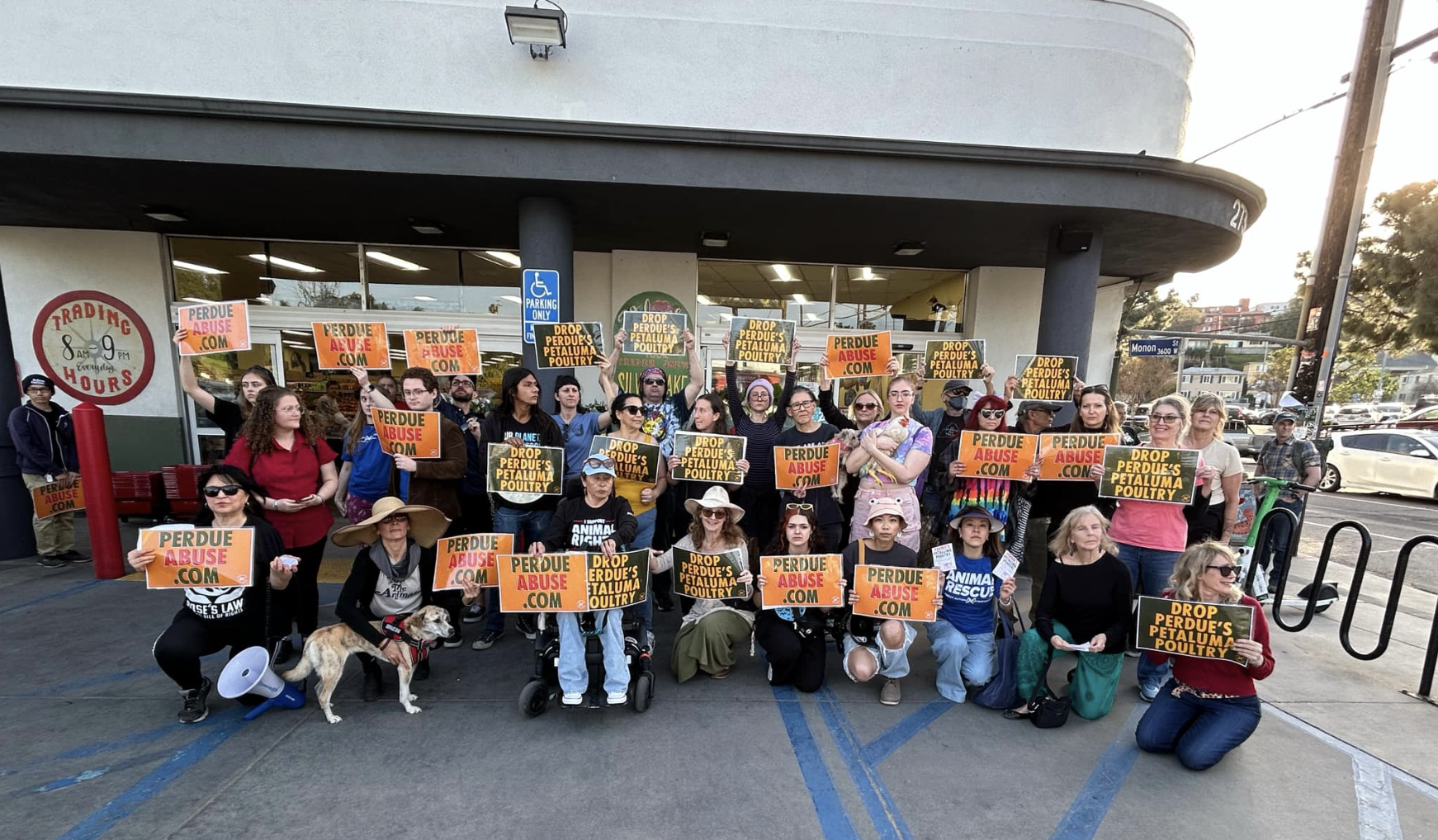Trader Joe’s Is Suing Me to Keep You in the Dark
Trader Joe’s is known as “America’s most reputable brand,” and I’m learning firsthand that this might be because they relentlessly silence their critics and go to great lengths to protect their image from public scrutiny.

Trader Joe’s is known as “America’s most reputable brand,” and I’m learning firsthand that this might be because they relentlessly silence their critics and go to great lengths to protect their image from public scrutiny.
Last week, I was served with a lawsuit from Trader Joe’s. They’re also suing Direct Action Everywhere (DxE), the organization I lead, and four of my co-organizers. Why? Because we have been protesting them over their continued partnership with Perdue’s Petaluma Poultry, which supplies much of the chicken sold in their hundreds of California locations.
When you see a package of chicken sold under the Trader Joe’s brand and labeled as “organic” and “free-range,” you might think there’s some Trader Joe’s farm out there where animals run around outdoors, cared for by smiling farmers in Hawaiian t-shirts. Sadly, that is not the case. The USDA requires ‘meat’ products to be stamped with a plant code, and if you can find this code you can find out exactly where that individual animal was slaughtered. This is how we traced the Trader Joe’s packaging back to the infamous Perdue’s Petaluma Poultry slaughterhouse. They’re stamped with the code “P 2882”.
Petaluma Poultry is a wholly-owned subsidiary of Perdue, the fourth largest chicken killer in the country. Inside Perdue’s Petaluma Poultry factory farms and slaughterhouses, DxE investigators have documented birds collapsed on the floor or stuck on their backs, and unable to walk to food or water; birds with splayed legs and open wounds; birds who entered the slaughterhouse scalder while still conscious and were boiled alive; and birds suffering from infectious diseases that threaten public health.
Petaluma Poultry's parent company, Perdue, recently settled a lawsuit over child labor violations (migrant children were forced to work in one of their slaughterhouses at night) and is currently embroiled in several other lawsuits, including one filed by local residents accusing them of knowingly polluting their well water with dangerous forever chemicals.
Trader Joe’s is abundantly aware of these issues. For months, people across the country have been calling on Trader Joe's to cut ties with Perdue's Petaluma Poultry. They have written letters, sent emails, called their customer service line, commented on social media, emailed the CEO Bryan Palbaum, and protested - even directly at their headquarters and at their original store location, both in Los Angeles County.
Rather than take accountability, Trader Joe’s has taken ample steps to try to shut us up and shield their customers from this information. They have refused all offers of conversation, have filtered and blocked comments on their social media so any comments related to Perdue and Petaluma Poultry are hidden from their audience, called police and had activists arrested for protesting, removed Google reviews, and sent cease and desist letters to grassroots organizers across the country. Now, they've filed a lawsuit against our entire organization to prevent us from "expressing our views" at their stores. All in an attempt to continue supplying from an animal-abusing factory farm without scrutiny.
This is a broader trend in animal exploiting industries. What we do to animals is so heinous that most people cannot stomach watching a few minutes of slaughterhouse footage. Corporations know this, so their tactics are to suppress information, transparency, and dialogue. Trader Joe’s is no different. If you shop at Trader Joe’s, ask them to do better, and don’t fall for deceptive, ‘humane-washing’ labels and marketing. Challenge yourself to take a close look at where the animals in your cart are really coming from, and what kind of a life they really lived. When you do, you might find yourself inspired to join the next protest.



